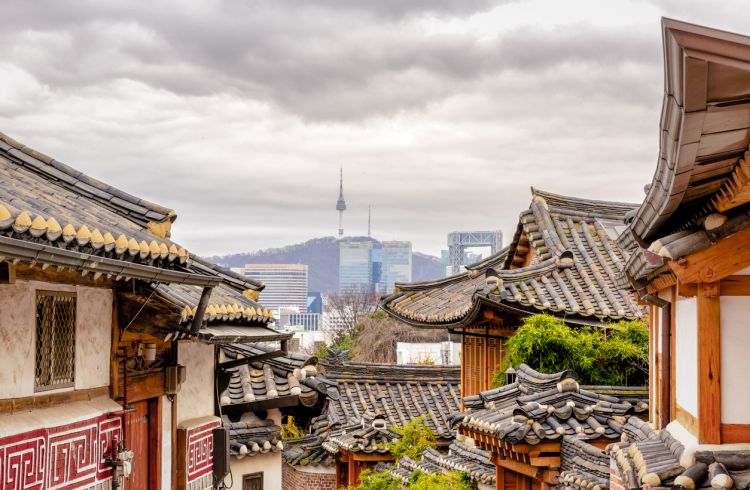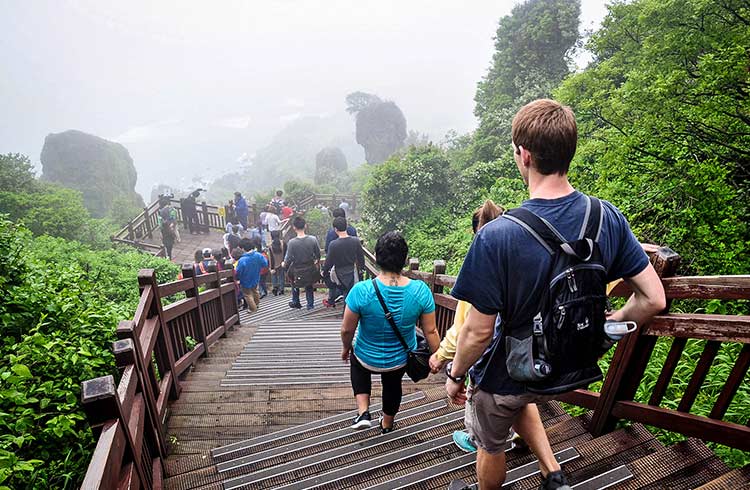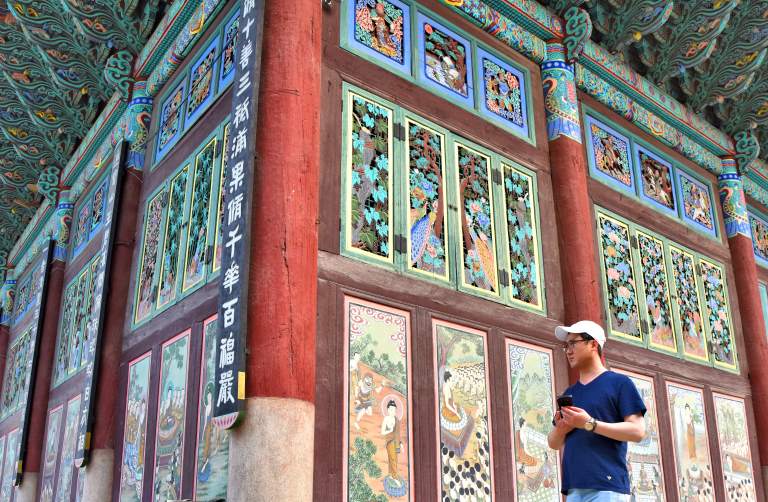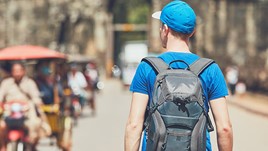Is South Korea Safe? 8 Essential Travel Tips for Visitors
Is there a lot of crime in South Korea? Should you be worried about tensions between the North and South? Here are our top safety tips for travelers to South Korea.
 Photo © iStock/uschools
Photo © iStock/uschools
South Korea is a safe destination, but, does that mean travelers have nothing to worry about?
- Travel health tips for South Korea
- Is Seoul Safe?
- How to avoid crime in South Korea
- Racism in South Korea
- Tensions between North and South Korea
- How real is the threat of nuclear war from North Korea?
- Just how safe is South Korea?
Travel health tips for South Korea
See your travel doctor prior to visiting South Korea, and make sure you have all the recommended booster shots and vaccinations before you go. Other diseases such as measles mumps and rubella (MMR), diphtheria-tetanus-pertussis, varicella (chickenpox), polio, and your yearly flu shot should be up to date.
Is Seoul safe?
Each city in South Korea suffers from the same criminal activity as any other city around the world. From petty thieves and con artists to drunken brawlers, danger could be a threat to anyone – it's about knowing the areas to avoid and tactics to stay safe.
Just watch out for pickpockets in crowded areas of Seoul, question any extra friendly people (who are probably trying to scam you), and watch out when you're crossing busy roads.
If there is a large demonstration or protest (which are common in Seoul), walk the other way and avoid these crowds, which may turn violent.
How to avoid crime in South Korea
- Keep your money and valuables out of sight and out of reach
- Be cautious if you go out by yourself late at night, especially if you're a woman traveling alone
- Be wary of anyone who approaches you out of nowhere
- Don't insult anyone's family, friends, culture, ethnicity or religion (obvious, we know)
- Don't leave valuables in your hotel room that you don't want stolen
- Only take taxis that are marked like taxis, and if you're confused, have your hotel/hostel call a legitimate service for you before you leave your room
- Learn how to say, "Please," "Thank you," "Hello," and "Goodbye" in Korean, and use them when appropriate.
Be aware of where you're going, and try to appear confident as you explore the urban landscapes of Seoul, Daejeon, Busan, Jeonju, and other major cities.
South Korea says no to contraband items
This should be obvious, but when you travel outside your home country, please don't bring any type of contraband items with you.
South Korea take the matter very seriously: travelers will be charged a hefty fine, and face long jail sentences for bringing unauthorized goods into the country. This includes narcotics, some prescription drugs, health supplements, firearms, ammunition and explosives, as well as radio equipment, and gold.
Marijuana is also taboo in South Korea. Possession and consumption comes with a large fine and possibly jail time as well, so think again if you are planning to have a cheeky smoke.
Be careful what books and magazines you bring into the country, as anti-obscenity laws are very strict.
Know that if you commit a serious enough crime, you may be liable for the death penalty – even though you're not a citizen. Executions are still a matter of debate in South Korea, but people have called for executions when it comes to violent crime.
Racism in South Korea
Given South Korea's very strong sense of national, ethnic, and racial pride, don't be surprised if some of the legal adjudications seem unfairly biased – some might suggest there's an undercurrent of racism.
If a Korean man accosts you on the street, think twice before hitting back. Unfortunately, the law will side with the Korean nearly every time. This could be the case in serious crimes like rape, though if you are the victim of such a crime, you should consult with your nation's embassy to see what can be done about legal recourse.
Tensions between North and South Korea
In South Korea (where reporting North Korean rhetoric is banned) life goes on as usual despite the North and South technically being at war.
In April 2018, North Korea announced a halt to nuclear and intercontinental ballistic missile testing, although ome missile testing has resumed. Tensions between North and South Korea can change with little notice. For the latest information, check your government travel advisory, and follow their advice.
North Korea and South Korea officially are still at war. No surrender or peace pact was ever signed. Consequently, the media likes to report about the tension on the peninsula regularly. Things were tense in 2017 and early 2018 with sabre-rattling (or missile rattling) from North Korea. Despite this, 15 million people visited South Korea in 2018, and it is still considered one of the safest destinations in the world.
The warning for visitors usually occurs a day after a warning from North Korea, advising foreign governments to evacuate their embassies because their safety couldn't be guaranteed in the event of hostilities.
How real is the threat of nuclear war from North Korea?
In 2020, during the COVID-19 pandemic, North Korea blew up an inter-Korean liaison office on its side of the border, which triggered further tensions.
Aside from the continual tit for tat between North Korea and the US and the occasional weapons test, Kim Jong Un hasn't really followed through on any threats. Consider downloading the South Korean Government's "Emergency Ready" app before you go, just in case there are any new threats.
So far, there has been no gathering of troops on the border or activation of hardware. Tensions usually heighten when there are joint US-South Korea exercises.
Despite threats from the north, South Koreans tend to go about their lives.
There was a show of diplomacy by both Korean nations when athletes competed together at the PyeongChang 2018 Olympic Winter Games. Athletes also marched together during the opening ceremony under a unified peninsula flag. The last time this happened was in 2002 at the Salt Lake City Winter Olympics.
Dignitaries including Kim Jong Un's sister made the trip south, the first time anyone from the Kim dynasty has visited its southern neighbor. With opportunities for future talks between the two nations, it raises some hope for more peaceful times on the Korean Peninsula and potential unification.
So, just how safe is South Korea?
South Korea has one of the lowest crime rates in the modern world, so a lot of this article is, in truth, hyperbolic. In other words, you shouldn't decide not to go to South Korea just because you're concerned about crime that could just as easily happen anywhere else in the world – perhaps even at home.
There's so much to see, from historic temples to politically intense spots (such as the DMZ with North Korea) to ultra-modern cities and peaceful honeymoon resorts. South Koreans are extremely friendly, and this friendliness comes from their pride in their heritage.
If you're trying to find the best time of year to travel to South Korea, avoid typhoon season, which runs from June to November. If you have a trip booked for typhoon season, stay up to date ahead of your flight to make sure there are no cancellations due to severe weather.
South Korea is located in a seismically active zone, and although earthquakes aren't as common here as they are in Japan or China, it's important to know what to do if an earthquake does occur.
Keep an eye on developments and travel advisories on coronavirus and tensions between the North and South. But make sure you know the difference between rhetoric, propaganda and real risk from North Korea.
As you would elsewhere, respect and celebrate their pride, get to know their story, and go out of your way to learn a bit of the local language. The chances of you running into any sort of criminal activity are slim to none. For now, avoid traveling to South Korea until the coronavirus outbreak has been contained, and as always, check your government's travel advisory for the latest information.
Related articles
Simple and flexible travel insurance
You can buy at home or while traveling, and claim online from anywhere in the world. With 150+ adventure activities covered and 24/7 emergency assistance.
Get a quote


No Comments